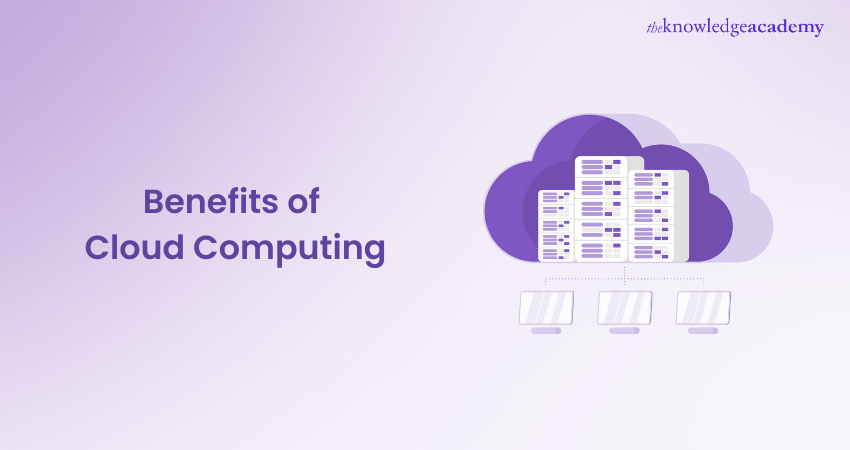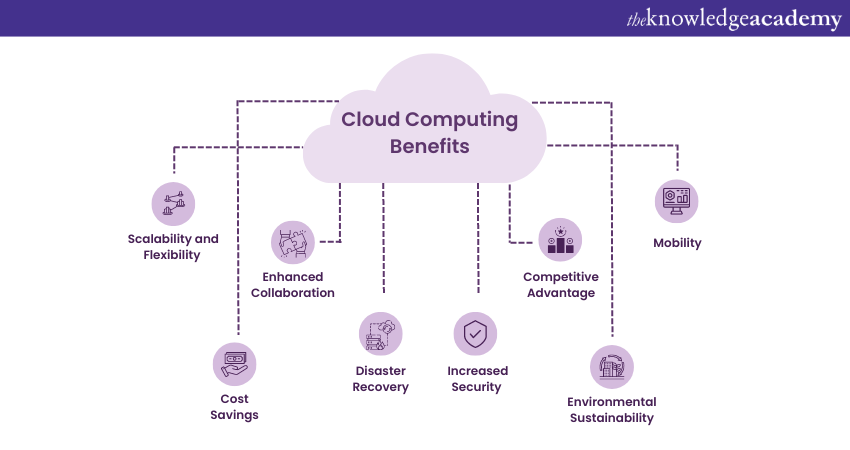We may not have the course you’re looking for. If you enquire or give us a call on 01344203999 and speak to our training experts, we may still be able to help with your training requirements.
We ensure quality, budget-alignment, and timely delivery by our expert instructors.

Cloud Computing has revolutionised the way businesses operate, offering unparalleled advantages that can transform both day-to-day functions and long-term strategies. But what are the true Benefits of Cloud Computing? How can this technology help you stay competitive in a rapidly evolving market? Explore this blog to get answers to all these questions.
Are you ready to explore how Cloud Computing can elevate your business? Let's dive into the Benefits of Cloud Computing and see how this transformative technology can position your organisation for success in the digital age. The future of Cloud Computing will only enhance these benefits, bringing even more advanced tools and solutions to help businesses thrive.
Table of Contents
1) What is Cloud Computing?
2) Cloud Computing Benefits
a) Scalability and Flexibility
b) Cost Savings
c) Enhanced Collaboration
d) Disaster Recovery
e) Increased Security
f) Competitive Advantage
g) Environmental Sustainability
h) Mobility
i) Loss Prevention
j) Automated Updates on Software
3) Conclusion
What is Cloud Computing?
Cloud Computing is a transformative technology that allows users to access and store data, applications, and services over the internet, eliminating the reliance on local servers or personal devices. Using remote servers offers on-demand access to data storage and computing power without direct user management.
This technology provides numerous benefits, including flexible resource allocation, cost efficiencies, and rapid scalability. Businesses can innovate and adapt more easily with Cloud Computing. It supports a wide range of Cloud Computing Applications, from data storage to advanced analytics and Artificial Intelligence (AI). This technology revolutionises operations, enabling efficient service delivery and agile responses to market demands.
Cloud Computing Benefits
The advantages of Cloud technology encompass a range of features that companies can leverage to optimize their operations and gain a competitive edge. In the midst of this transformation, Cloud Computing in Healthcare is revolutionizing the industry with enhanced efficiency, security, and scalability. Let's explore the benefits of Cloud Computing in detail.

Scalability and Flexibility
Cloud Computing enables businesses to adjust resources according to demand, efficiently managing peak loads without the need for costly hardware investments. This ensures optimal performance at all times.
Cloud Computing provides access to data and applications from any location with an internet connection. This supports a mobile workforce and facilitates seamless collaboration, thereby enhancing productivity and convenience.
Cost Savings
Cloud Computing operates on a pay-as-you-go model, significantly reducing costs by eliminating the need for large upfront investments in physical infrastructure. Businesses only pay for the resources they use, allowing for better Financial Management and resource allocation.
This is particularly beneficial for startups and small businesses, which often face budget constraints. By avoiding costly hardware purchases and maintenance, companies can allocate funds to strategic areas, resulting in significant savings and increased efficiency.
Enhanced Collaboration
Cloud Computing Platforms allow multiple users to access and edit documents simultaneously, promoting real-time collaboration. This enhances teamwork by enabling instant feedback and shared access to project files. As a result, workflows are streamlined, coordination is improved, and project completion is more efficient.
This collaborative environment fosters better communication and reduces delays, ensuring that all team members are on the same page. With Oracle Fusion Cloud, it becomes even easier to manage and complete projects successfully.
Learn to handle Cloud infrastructure and Virtual Machines with Cloud Computing Training!
Disaster Recovery
Cloud services provide robust disaster recovery solutions, ensuring that data is consistently backed up and easily recoverable during emergencies. This capability significantly enhances business continuity by minimising both downtime and data loss.
By leveraging cloud-based disaster recovery, organisations can quickly restore operations after disruptions, maintaining productivity and safeguarding critical information. This reduces the impact of unforeseen events and helps businesses maintain their service commitments and operational integrity.
Increased Security
Cloud providers implement advanced security measures to protect sensitive data, such as encryption, firewalls, and regular security updates. Encryption ensures that data is accessible only by authorised users, both in transit and at rest. Firewalls prevent unauthorised access, acting as a barrier against potential threats.
Regular security updates address vulnerabilities and enhance security protocols. These features collectively help safeguard sensitive information and ensure compliance with industry standards and regulations. This maintains the integrity and confidentiality of data stored in the cloud.
Join our Microservices Architecture Training and learn concepts of Load Balancing and security!
Competitive Advantage
Although Cloud Computing is becoming more popular, some businesses still prefer to keep everything local. This choice can put them at a disadvantage compared to those leveraging cloud benefits. By adopting a cloud-based solution early, you gain a head start on the learning curve.
Environmental Sustainability
In today’s environmental climate, simply placing a recycling bin in the breakroom is insufficient for true sustainability. Organisations must adopt comprehensive solutions to reduce waste at all levels. Hosting on the cloud is a more environmentally friendly option, significantly reducing the carbon footprint.
Gain familiarity with OpenStack! Try our Linux OpenStack Administration Training today!
Mobility
Scalability refers to the ability of a product to expand its impact on customers and meet their needs. The widespread availability of the Cloud highlights mobility as its key characteristic. Through Cloud connectivity, businesses can effortlessly link up from various devices such as smartphones, iPads, and laptops.
Due to the accessibility of Cloud systems, businesses can quickly adjust their scale in response to changing conditions and demands. Additionally, it facilitates rapid response, immediate solutions, and continuous connectivity.
Loss Prevention
Storing data in the cloud reduces the Cloud Computing Risk of loss due to disasters like hardware failures, security threats, or user errors. Additionally, the cloud minimises downtime from technical issues and inactive servers, saving nearly six hours per week—almost a full workday. Therefore, users seeking to save time and protect their data prefer Cloud Computing.
Automated Updates on Software
Automated software updates ensure that systems always have the latest features, Cloud Security patches, and performance improvements without manual intervention. This reduces the workload on IT staff, minimises security vulnerabilities, and ensures optimal performance.
By keeping software up-to-date automatically, businesses can avoid disruptions, enhance security, and maintain compliance with the latest standards and regulations in Utility Computing and Cloud Computing. This process enhances efficiency and ensures applications run smoothly and securely, providing a better user experience and protecting against threats.
Global Reach
To minimise application latency, data centres should be located close to users. AWS and Azure have data centres on six continents, while Google and IBM cover five. This extensive global reach is a key benefit of Cloud Computing, especially for organisations serving international customers.
With cloud-based services, you can deploy applications in any region worldwide and utilise edge locations to cache data, further reducing latency. Achieving such global reach independently would be incredibly challenging and prohibitively expensive.
Explore cutting-edge Cloud Computing Courses designed to enhance your career prospects - join now and accelerate your professional journey!
Conclusion
Harness the Benefits of Cloud Computing, such as scalability, cost savings, enhanced collaboration, disaster recovery, and increased security. According to Cloud Computing Statistics, these benefits help businesses stay competitive and adaptable. Drive your organisation towards success and innovation by adopting Cloud Computing today. Embrace this transformative technology to elevate your operations and reach new heights.
Get an understanding of Terraform for designing and arranging infrastructure with our Terraform Training.
Frequently Asked Questions
Who are the Cloud Service Actors?

Cloud service actors include cloud service providers (such as AWS, Google Cloud, and Microsoft Azure), cloud service consumers (businesses and individuals using cloud services), cloud service brokers (facilitators of service usage), and cloud service auditors (evaluators of cloud service compliance and performance).
What are the Major Service Providers in Cloud Computing?

The major service providers in Cloud Computing include Amazon Web Services (AWS), Microsoft Azure, Google Cloud Platform (GCP), IBM Cloud, and Oracle Cloud. These providers offer a wide range of cloud services, including computing, storage, databases, and analytics.
What are the Other Resources and Offers Provided by The Knowledge Academy?

The Knowledge Academy takes global learning to new heights, offering over 3,000 online courses across 490+ locations in 190+ countries. This expansive reach ensures accessibility and convenience for learners worldwide.
Alongside our diverse Online Course Catalogue, encompassing 19 major categories, we go the extra mile by providing a plethora of free educational Online Resources like News updates, Blogs, videos, webinars, and interview questions. Tailoring learning experiences further, professionals can maximise value with customisable Course Bundles of TKA.
What is The Knowledge Pass, and How Does it Work?

The Knowledge Academy’s Knowledge Pass, a prepaid voucher, adds another layer of flexibility, allowing course bookings over a 12-month period. Join us on a journey where education knows no bounds.
What are the Related Courses and Blogs Provided by The Knowledge Academy?

The Knowledge Academy offers various Cloud Computing Courses, including Cloud Computing Training, Microservices Architecture Training and Certified Artificial Intelligence (AI) For Cloud Professionals Training. These courses cater to different skill levels, providing comprehensive insights into Cloud Computing Salary.
Our Cloud Computing Blogs cover a range of topics related to Cloud Computing, offering valuable resources, best practices, and industry insights. Whether you are a beginner or looking to advance your Cloud Computing skills, The Knowledge Academy's diverse courses and informative blogs have got you covered.
Upcoming Cloud Computing Resources Batches & Dates
Date
 Google Cloud Storage Training
Google Cloud Storage Training
Fri 16th May 2025
Fri 18th Jul 2025
Fri 19th Sep 2025
Fri 21st Nov 2025






 Top Rated Course
Top Rated Course



 If you wish to make any changes to your course, please
If you wish to make any changes to your course, please


